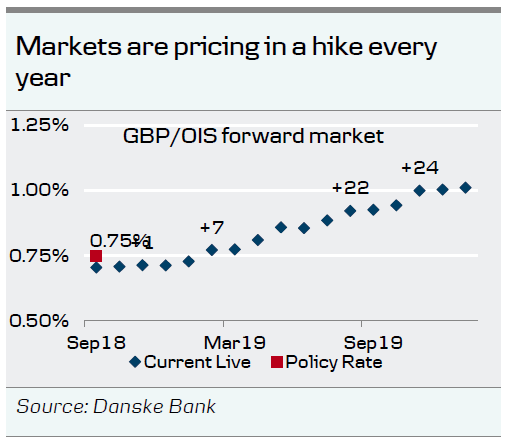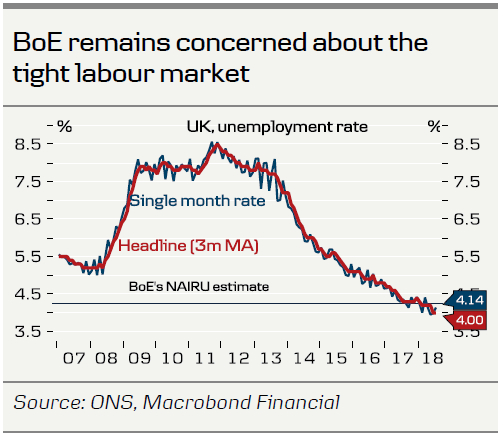As expected, the Bank of England (BoE) voted unanimously to keep the Bank Rate at 0.75%. As it was one of the small meetings without an updated Inflation Report or press conference and following last month’s hike, this did not come as a surprise.
The BoE did not make any big policy signal shifts either, although it recognises Q3 growth may be higher than previously anticipated after the stronger-than-expected GDP growth print in July. The statement still says that ‘any future increases in the Bank rate are likely to be at a gradual pace and to a limited extent’ and that ‘ongoing tightening of monetary policy […] would be appropriate’. At the August meeting, the BoE hinted that while the nominal natural rate of interest (the rate where monetary policy is neither expansionary nor contractionary) is probably around 2-3% in the long run, it is around 1.5% currently – basically only three hikes away.
We still expect the BoE to hike around once a year and our base case is that the next hike will arrive in May 2019; therefore, after the UK formally leaves the EU. It may be earlier if the economy continues to surprise on the upside. On the other hand, the central bank also stated that Brexit uncertainty has gone up among businesses and in particular investors since the August meeting. The rate decision also depends on the outcome of the Brexit negotiations, as we are approaching the ‘end game’ in Q4.
EUR/GBP is little changed as the 9-0 vote for an unchanged Bank Rate was widely expected. The UK money market curve is relatively flat, with the next BoE rate hike priced to arrive in November 2019. While this is slightly dovish compared to our call for a hike in May 2019, we think pricing is fair for now – especially given the uncertainty related to Brexit.
We expect GBP to remain very volatile and sensitive to Brexit news in coming months and, overall, we still see EUR/GBP risks skewed to the upside ahead of the UK Conservative party’s annual congress, due to start on 30 September.
It was announced earlier this week that BoE Governor Mark Carney has extended his term to January 2020 ‘to support a smooth exit of the United Kingdom from the European Union’. This should not have any policy implications in the short run.









